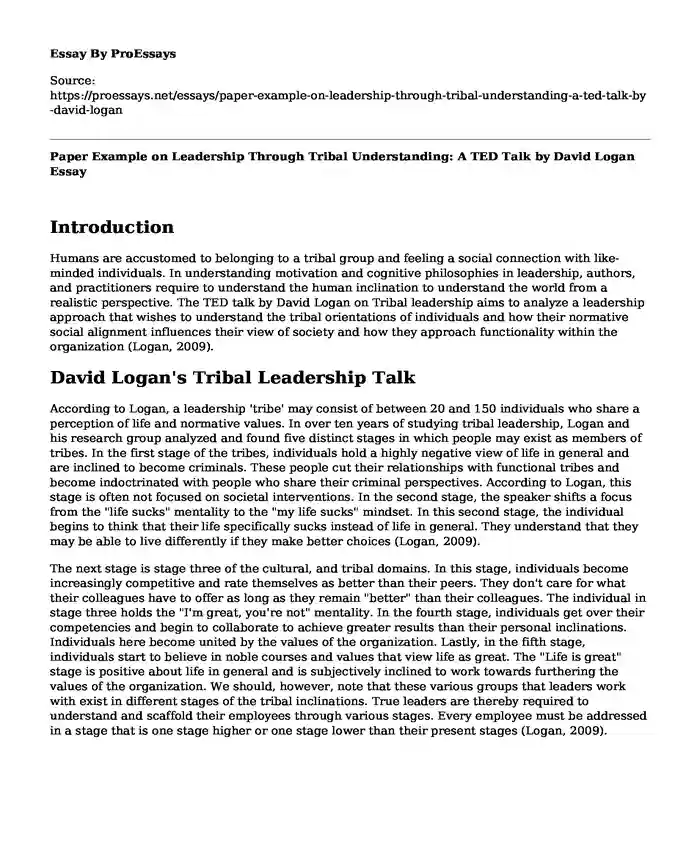Introduction
Humans are accustomed to belonging to a tribal group and feeling a social connection with like-minded individuals. In understanding motivation and cognitive philosophies in leadership, authors, and practitioners require to understand the human inclination to understand the world from a realistic perspective. The TED talk by David Logan on Tribal leadership aims to analyze a leadership approach that wishes to understand the tribal orientations of individuals and how their normative social alignment influences their view of society and how they approach functionality within the organization (Logan, 2009).
David Logan's Tribal Leadership Talk
According to Logan, a leadership 'tribe' may consist of between 20 and 150 individuals who share a perception of life and normative values. In over ten years of studying tribal leadership, Logan and his research group analyzed and found five distinct stages in which people may exist as members of tribes. In the first stage of the tribes, individuals hold a highly negative view of life in general and are inclined to become criminals. These people cut their relationships with functional tribes and become indoctrinated with people who share their criminal perspectives. According to Logan, this stage is often not focused on societal interventions. In the second stage, the speaker shifts a focus from the "life sucks" mentality to the "my life sucks" mindset. In this second stage, the individual begins to think that their life specifically sucks instead of life in general. They understand that they may be able to live differently if they make better choices (Logan, 2009).
The next stage is stage three of the cultural, and tribal domains. In this stage, individuals become increasingly competitive and rate themselves as better than their peers. They don't care for what their colleagues have to offer as long as they remain "better" than their colleagues. The individual in stage three holds the "I'm great, you're not" mentality. In the fourth stage, individuals get over their competencies and begin to collaborate to achieve greater results than their personal inclinations. Individuals here become united by the values of the organization. Lastly, in the fifth stage, individuals start to believe in noble courses and values that view life as great. The "Life is great" stage is positive about life in general and is subjectively inclined to work towards furthering the values of the organization. We should, however, note that these various groups that leaders work with exist in different stages of the tribal inclinations. True leaders are thereby required to understand and scaffold their employees through various stages. Every employee must be addressed in a stage that is one stage higher or one stage lower than their present stages (Logan, 2009).
Summary of the Tribal Leadership Speech
David Logan's tribes' theory appears to sufficiently address the motivational levels through which leaders may address their employees to gain a values alignment within the organization. Through relevant anecdotes, Logan succeeds in laying a workable framework through which leaders may approach their human-centered leadership. The leaders must first understand the stages of all the tribes within their organizations and develop methodologies for scaffolding them to the higher stages. It is furthermore, essential to note that the individuals – just like in the popular motivational theories – may exist across stages of subjective orientation. Leaders may, as such, address the individuals in stage five needs by employing the stage three approaches (owning the vision and values they wish to share).
Conclusion
I thereby support the tribal leadership framework by Logan and believe that when all employees are addressed according to their way of viewing the world, the leader can lift them to higher and more value-centered levels.
Reference
TED. (2009). Tribal Leadership. TED. https://www.ted.com/talks/david_logan_tribal_leadership?utm_source=tedcomshare&utm_medium=social&utm_campaign=tedspread.
Cite this page
Paper Example on Leadership Through Tribal Understanding: A TED Talk by David Logan. (2023, Nov 19). Retrieved from https://proessays.net/essays/paper-example-on-leadership-through-tribal-understanding-a-ted-talk-by-david-logan
If you are the original author of this essay and no longer wish to have it published on the ProEssays website, please click below to request its removal:
- Essay Example on Consumerism Flourishes: Impact on US Economy & Culture
- 1982 Tylenol Crisis: Johnson & Johnson's Fight for Survival - Essay Sample
- Research Paper on Social Media and Activism: Exploring the Role of Networks & Societies
- Global Business: Impact of Multinational Enterprises - Essay Sample
- Leadership: Building Proactive, Resilient Teams for Internal Change - Essay Sample
- Research Paper on Designing an Efficient Supply Chain: Balancing Transportation, Inventory & Manufacturing
- The 5-G Network and Its Ethical Issues - Paper Sample







